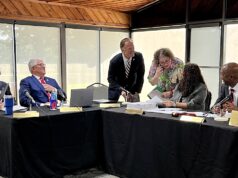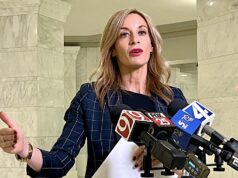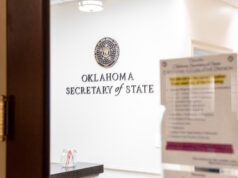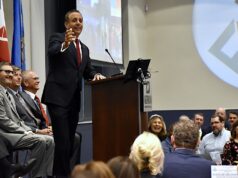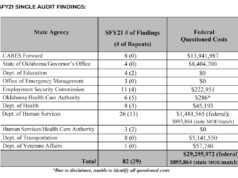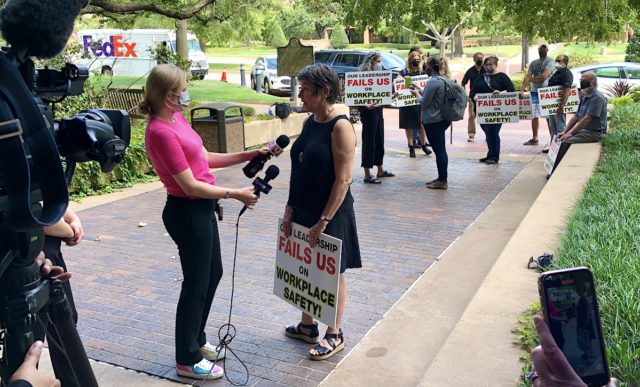

As members of the University of Oklahoma Board of Regents were preparing to move into their second executive session of the day, an OU faculty member asked if she could address the board.
Julie Ward, a literature professor, proceeded to outline the demands of about a dozen faculty members who had made signs and demonstrated prior to Monday’s meeting.
In short, Ward and her fellow faculty are asking university leadership to implement a mask mandate, a vaccine mandate and the option for remote working environments.
“It breaks my heart to see the way faculty, students and staff are left to our own devices and are abandoned by the leadership of this state,” Ward said, noting that she is a proud Oklahoman whose high school diploma features the signature of OU regent and then-Gov. Frank Keating.
Ward then read regents a letter written Aug. 11 that she said had been signed by more than 550 people. The letter begged regents and OU administrators to “enact effective, evidence-based policies to protect the community.”
After a second faculty member briefly echoed the request, the board again was preparing to enter executive session when a woman who identified herself as a parent also asked to speak.
“We want to make sure there is a choice and that students are not locked in to being on Zoom,” the parent said. “It was a disaster last time.”
The parent did not identify herself before leaving the meeting, but she asked regents to focus on “educating children” instead of “politics.”
“As much as I appreciate the teachers who want to protest and make a stand and walk out tomorrow, it’s impacting students,” she said.
Keating applauded the woman’s remarks, and the board entered a second executive session, which lasted an hour.
Seeking action
In conjunction with two days of scheduled OU Board of Regents meetings Monday and Tuesday, an organization branded as OU Days of Action announced last week that it was calling for faculty, staff and students to walk out of classes.
Beyond reports that some professors had cancelled classes or assured students they would not be taking attendance, Monday’s action at the OU regents meeting was limited to about a dozen faculty members who, clad mostly in black, held signs outside of the Robert M. Bird Health Sciences Library in Oklahoma City prior to the day’s meeting.
By the time OU President Joe Harroz spoke during the regents meeting, about half of the assembled demonstrators had departed, one proclaiming she had to make a “tenure vote.”
Harroz briefly acknowledged the audience members.
“One need to look no further than the signs that are in front of us here,” he said. “This is a remarkably uncertain time. As we look at the pandemic and how we approach it, there are no perfect answers.”
While he said “safety is essential and it’s critical,” Harroz’s brief speech was unlikely to allay the concerns of the faculty in attendance.
“I’m here because, since school began, I have been serving as a part-time counselor for my students on all issues COVID-related,” said European history professor Jennifer Davis. “That’s because the university is failing to provide clear leadership, clear policies about congregate living, classroom spaces, about public spaces and how we should behave in those spaces. That’s really what I want.”
Davis said she believes OU should mandate vaccination against COVID-19 as a requirement for enrollment and employment.
“Over 1,000 colleges have required vaccines for everyone returning to campus. That’s students, faculty and staff. I think that would be appropriate. That’s one of our demands,” Davis said. “The university has rescinded the option for remote work, and that seems like an important piece, once again to reduce density on campus to allow those jobs that can be done remotely to be done remotely.”
Zoe Sherinian, an ethnomusicology professor, also said she supports a vaccine mandate regarding COVID-19.
“I looked at the vaccine requirement in general for any student attending OU — it’s on the website — so why can’t we add the COVID vaccine to that? There are several others required.”
OU’s immunization webpage notes:
Oklahoma Statutes, Title 70 sec. 3244 requires that all students who enroll as a full-time or part-time student in an Oklahoma public or private postsecondary institution provide documentation of vaccinations against Hepatitis B (three doses) and measles, mumps and rubella (MMR – two doses).
Asked if she is required to be vaccinated against those diseases as a faculty member, Sherinian said she did not know but would not be opposed.
“In order to do my research and go to India where I do my research, I have to get all sorts of vaccinations and take medicines,” she said.
Sherinian said her semester has gone fairly smoothly so far, and that she moved her graduate-level course to an online format because it is a discussion-based class.
She said she is immunocompromised and that she wishes OU President Joe Harroz would authorize a mask mandate for classrooms in the same way that local school district superintendents have worked around a controversial state law that prohibits boards of education from implementing a mask mandate in many circumstances.
Sherinian said she and other professors can only say it is their “expectation” that students will wear masks in class. Most do, she said, but some do not.
“Whatever political reasons or social identity reasons that students might have to not respect and adhere to the request by the administration and the faculty member to wear masks, it’s disrespectful,” she said. “It’s not being concerned about the larger community and their responsibility that comes with the privilege of attending the University of Oklahoma.”
‘Mitigation strategies within the scope of the law’

At the Robert M. Bird library, regents and visitors were met Monday by signs saying, “Please wear a mask indoors.” All regents were masked during the meeting, as were all staff and visitors. At the board’s June and July meetings, almost no one in attendance was wearing a mask.
In response to the OU Days of Action organization’s demands for mask and vaccine mandates, OU Vice President for Marketing and Communications Mackenzie Dilbeck provided a statement to media:
Keeping the OU community healthy remains a top priority. The university continues to work closely with the Faculty and Staff Senate Executive Committees – the elected representative groups for the OU employee community – communicating and consulting with these bodies on a regular basis. Mitigation strategies within the scope of the law have been implemented. The university urges all OU community members to get vaccinated and asks that everyone continue practicing healthy behaviors, including frequent hand washing and staying home when ill. Two vaccination incentive programs are underway – one for students and one for faculty and staff. Community members are expected to mask indoors, especially in high-density settings, such as classrooms and at special events when not eating or drinking. The university has also announced that should there be a confirmed COVID-19 positive case in class, the class will continue meeting in-person, but masking will be mandated for two weeks during the quarantine period. In an effort to keep these guidelines top of mind, campus signage and messaging related to masking and vaccination are widely present throughout all three OU campuses. The university is closely monitoring COVID-19 cases in the state and will be careful to make any necessary changes to its protocols and policies within what the law allows.
After the conclusion of Monday’s meeting, OU Board of Regents Chairman Michael Cawley told NonDoc that he and his fellow board members had entrusted specific COVID-19 mitigation decisions to Harroz and his team.
“It’s a hard one, and there are so many different competing views and competing interests. I know that we try to take into account all of them. But at some point, you have to try to make a decision,” Cawley said. “We feel like Joe and his team are much closer to the expertise and have more availability of the professional opinions and are in a better position to make recommendations on these kinds of matters. So it’s not that we don’t care or don’t listen — they certainly advise us what they’re going to do — but we have every confidence in the information they’re receiving and how they’re processing it to come up with a decision that impacts everybody in the best way.”
Davis, however, argued that public health experts are largely united in their support for masks and other mitigation strategies not being required at OU.
“We actually have the experts (at OU) who are designing some of the therapeutics and treatments, and their guidance is being ignored,” she said. “It’s baffling to me.”
Davis identified difficulty accessing COVID-19 tests as another concern for faculty, staff and students.
“The testing is really a nightmare. We have students who can’t get a test on campus, so they drive home to Dallas or Fort Worth to get a test there,” Davis said. “It’s immoral to send a student home to Houston to get a (COVID) test because they can’t get it in Norman. The university really needs to be investing a lot more than they are in a comprehensive testing program, in safety.”
During his remarks to the regents, Harroz emphasized OU’s incentives for students to get vaccinated, which he said have helped more than 7,000 students begin that process. He also hinted at the university’s financial reality: Students pay tuition when they are enrolled, and they are less likely to enroll for another year of “distance learning.”
“The contact with students — the interaction with students — we know that if it is delayed over and over again, they will drop out,” Harroz said.
But Davis and Sherinian said they also value that contact with students. They just want it to be done as safely as possible for all involved.
“My students are coming to me not saying, ‘I want a normal college experience, Dr. Davis.’ They are coming to me and saying, ‘I volunteered at a hospice all summer, and what are we doing to be safe here?'” Davis said. “We know how to do that with limited risk. Nobody wants to stop doing their job, nobody wants to stop going to school, but we can do that more safely than we are doing it.”









